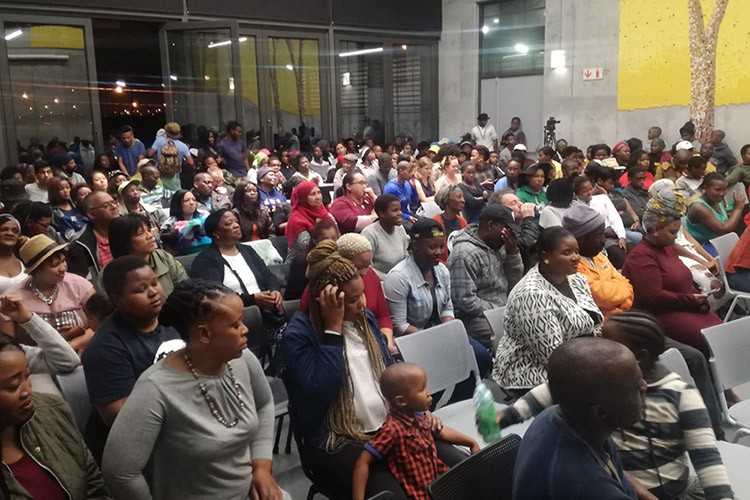30 August 2017
GroundUp: “We should be able to stay in cities where we work”
“We should be able to stay in cities where we work”
Activists from across the country meet to take housing struggle forward

“There are people who are being killed in Durban. There are people who are being ill-treated and their only crime is being poor, and that they want to stay in places that are closer to town,” said Thapelo Mohape from Abahlali baseMjondolo based in KwaZulu Natal.
He was speaking at a meeting of about 200 people held in Khayelitsha’s Isivivana Centre on Tuesday night. Activists from across the country gathered to highlight the difficulties that land and housing activists face.
The meeting, titled Dying for a Home in the City, was organised by the Social Justice Coalition (SJC), Tshisimani Centre for Activist Education and Ndifuna Ukwazi.
“At the core of the gathering today is that we see our … brothers and sisters dying and being killed at the hands of the state for demanding what should be rightfully theirs,” explained SJC general secretary Mandisa Dyantyi. “We find ourselves in a situation where people whose ancestors were born in this country are being excluded from the benefits and the land that this country has to offer.”
Mohape said, “We know very well that the apartheid government deprived black people of the right of living next to the city. Now that we as black people want to move to the cities post apartheid our very own black government is the one that is shooting and killing us.”
Mohape lives in a shack. He said activists in Durban are being threatened by politicians on a daily basis. “They think people who stay in shacks cannot think. They decide for us,” he said. “We have a housing problem in Durban not because houses are not being built but because houses are being sold by councillors to people with money.”
Mphumeleli Mdunga from Izwelethu community in Khayelitsha, who is part of a large land occupation that started in May, spoke about the threats that they received from officials including councillors. One activist who was at the forefront of the occupation, Mthunzi ‘Ras’ Zuma was shot dead on 28 May. “Even when one of us died we decided as a community that we will not back down. We will not let anyone die in vain because we are without housing. We need places to stay.”
“The system accommodates those with money not us poor people. We report to the police [but] we are ignored,” said Mdunga.
Labogang Malakaje from the Slovo Park Community Development Forum in Johannesburg, spoke about his community’s struggle to get government to provide decent living conditions. He described how they had to protest. “In 2007 we won. They said they will give us electricity, build us housing and provide us with sanitation.”
At the time Malakaje said the state only offered to build houses for 360 people. The remainder of the community would be moved 15 km away. The community then took the national and provincial governments to court. They won the case last year, he said. “We are proud that they will now build for 3,700 people,” he said.
Siyabonga Mahlangu from the Inner City Federation, also in Johannesburg said that in the context of fighting for land the “time for theory is done. It is time for practical.”
“We need to fight for what is rightfully ours. We should be able to go and stay in cities where we work. Our government fought for their freedom not ours. We need to fight for ourselves now,” he said. “We cannot afford to be scared to die,” said Mahlangu.
For domestic worker Sheila Madikane from Sea Point on Cape Town’s Atlantic Coast, the fight was different. She had not occupied land but was being evicted from a place she had stayed in since 1987. She won her eviction case on 25 August 2017. Madikane said she have been fighting to live in Sea Point along with other domestic workers for more than 15 years. She is part of Reclaim the City. “Land for people not land for profit is what we want. We were evicted but we never moved. We are in pain. We are in need of places to stay.”
“You rent a room in Sea Point for R2,500 [but] no visitors [are] allowed. [There is] no space to even cook. We are looking after their kids year-in and year-out. We only see our families for three weeks at the end of the year but we have no places to stay where we spend most of our time,” she said.
